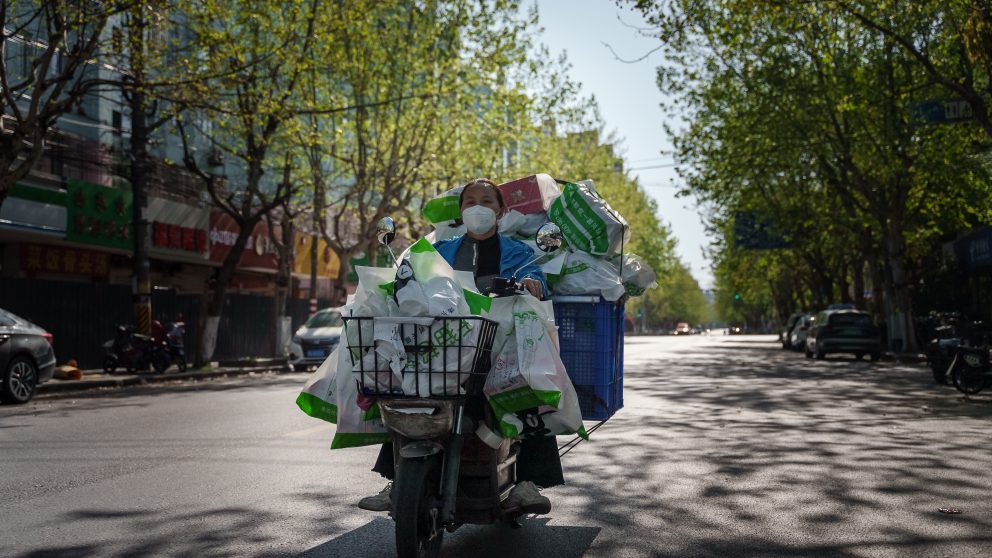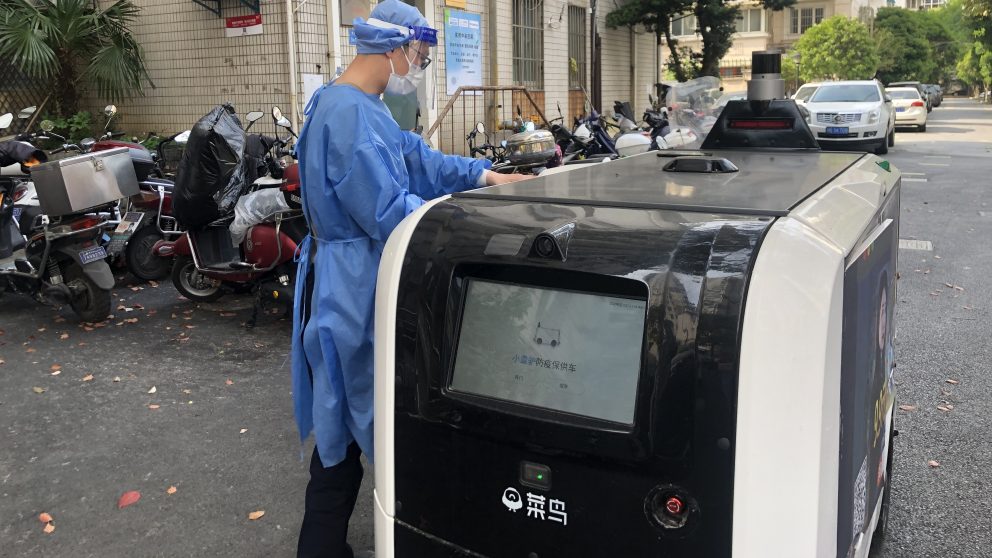


A Cainiao Post worker delivers food to residents in lockdown. Photo credit: Alibaba Group
Alibaba Group is mustering resources across its ecosystem to keep food delivery and distribution up and running as Shanghai enters its third week under lockdown.
A shortage in food and other essential goods has become one of the most pressing issues for the city’s 25 million residents, who remain confined to their apartments.
Alibaba’s delivery platform Ele.me, hypermarket chain Freshippo and logistics network Cainiao have banded together to feed whole communities, help vulnerable citizens and strengthen last-mile logistics – with some help from robotic friends.
“Our priority is to improve delivery capacity, coordinate with merchants to reopen businesses and build up urgent delivery channels to meet the needs of people in vulnerable situations,” said Xiao Shuixian, senior vice president of Ele. me at a press conference on Sunday.
The number of group buying orders handled by the platform has doubled each day since late March, according to the platform.
One For All
With many stores closing down amid the pandemic, Freshippo and Ele.me rolled out group buying services for locked down residents to boost food distribution efficiency.
On Freshippo, residents in the same building can choose different grocery combinations at varying prices with enough meat, eggs, vegetables and other staples to last several days.
To be sure, group grocery buyers have fewer food choices, but it’s worth it in times of high demand and strained supply.
Store operation efficiency is five times higher for group orders compared with individual orders, according to the platform. By April 7, 23 Freshippo stores and 4 Freshippo Membership Stores in Shanghai have started offering group buying services, reaching more than 5,300 residential compounds.
Ele.me is collaborating with local restaurants to supply group meal services. Residents can place their orders via an app, and once enough of their neighbors join, merchants will make deliveries the following day.
Over the past week, 4,000 platform merchants restarted their businesses after COVID-19 shutdowns and have started to take orders from residents in Shanghai.
Last-Mile Delivery
While platforms have invested in building up capacity to meet demand, they’ve also taken measures to address the lack of delivery capacity in the city.
Freshippo and Ele.me stores have started self-pickup channels, tapped public transport for delivery and partnered with volunteers to deliver food to residential compounds.
Alibaba also leveraged its automated delivery robot Xiaomanlv for last-mile delivery. Over a dozen automated delivery robots were running in Shanghai to address the last-mile delivery challenge in communities.



Each delivery robot can carry roughly 220 pounds of goods, which they deposit in front of residential buildings for volunteers to distribute among residents.
Alibaba’s robots shave 30 minutes on average off of the delivery process, but they won’t be doing all the heavy lifting. Roughly 3,000 couriers and warehouse workers are being brought in to address the shortfall of delivery capacity in the city.
Vulnerable Citizens
The city-wide lockdown exposed the digital divide, like the elderly, who aren’t digitally savvy, found it harder to navigate the precarious lockdown situation.
Cainiao designated a warehouse specifically to supply senior care centers in Shanghai. With hundreds of tons of rice and cooking oil stored, the warehouse is expected to send its goods to over 60 senior care centers in the city.
Ele.me rolled out urgent deliveries in Shanghai for groups in need. Initially targeting families running out of baby formula and other infant products, it now offers medical supplies for people with chronic diseases and daily necessities for seniors living alone.
By April 9, Ele.me received more than 40,000 requests for urgent deliveries, according to the platform. It has also fulfilled more than one million drug delivery orders in Shanghai from March 28, pooling medicines from pharmacies within and outside the city.
The platform ranks requests based on levels of emergencies and prioritizes the needs of those who are most vulnerable, said Xiao during the press conference.





